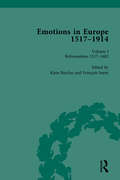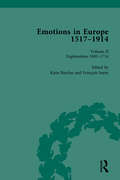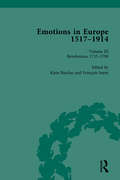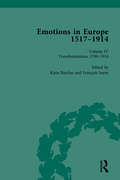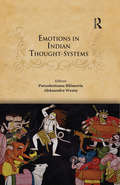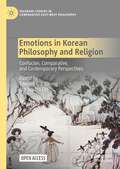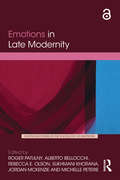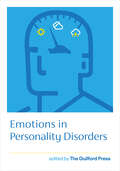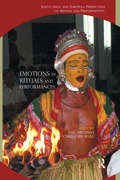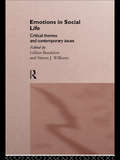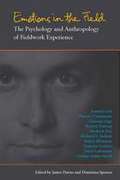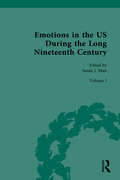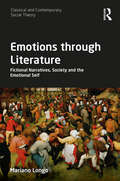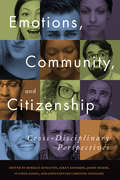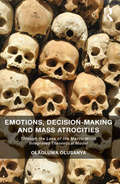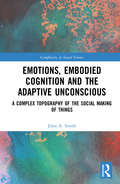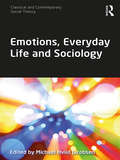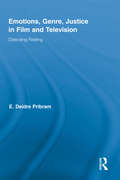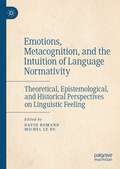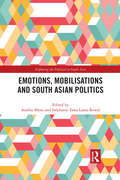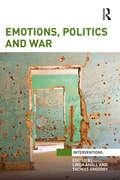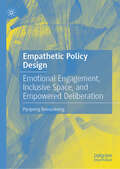- Table View
- List View
Emotions in Europe, 1517-1914: Volume I: Reformations,1517-1602
by Katie Barclay; François SoyerThis volume of primary sources focuses on the history of emotions in Europe and its empires between 1517 and 1602. The Reformation in 1517 was a key transformative moment in European history that required people to rethink the self, belief, and scientific knowledges – all of which shaped and were shaped by emotion. The study examines the subjects of the self, family and community, religion, politics and law, science and philosophy, and art and culture. Sources include letters, diaries, legal papers, institutional records, newspapers, science and philosophical writings, literature and art from a diversity of voices and perspectives. Accompanied by extensive editorial commentary, this collection will be of great interest to students of history and literature.
Emotions in Europe, 1517-1914: Volume II: Explorations, 1602-1714
by Katie Barclay; François SoyerThis volume of primary sources focuses on the history of emotions in Europe and its empires between 1602 and 1714. The study examines the subjects of the self, family and community, religion, politics and law, science and philosophy, and art and culture. Sources include letters, diaries, legal papers, institutional records, newspapers, science and philosophical writings, literature and art from a diversity of voices and perspectives. Accompanied by extensive editorial commentary, this collection will be of great interest to students of history and literature.
Emotions in Europe, 1517-1914: Volume III: Revolutions, 1714-1789
by Katie Barclay; François SoyerThis volume of primary sources focuses on the history of emotions in Europe and its empires between 1714 and 1789. The study examines the subjects of the self, family and community, religion, politics and law, science and philosophy, and art and culture. Sources include letters, diaries, legal papers, institutional records, newspapers, science and philosophical writings, literature and art from a diversity of voices and perspectives. Accompanied by extensive editorial commentary, this collection will be of great interest to students of history and literature.
Emotions in Europe, 1517-1914: Volume IV: Transformations, 1789-1914
by Katie Barclay; François SoyerThis volume of primary sources focuses on the history of emotions in Europe and its empires between 1789 and 1914. The study ends with WW1, by which point psychology and modern frameworks for the self had become standard knowledge. The study examines the subjects of the self, family and community, religion, politics and law, science and philosophy, and art and culture. Sources include letters, diaries, legal papers, institutional records, newspapers, science and philosophical writings, literature and art from a diversity of voices and perspectives. Accompanied by extensive editorial commentary, this collection will be of great interest to students of history and literature.
Emotions in Indian Thought-Systems
by Purushottama Bilimoria; Aleksandra WentaA stimulating account of the wide range of approaches towards conceptualising emotions in classical Indian philosophical–religious traditions, such as those of the Upanishads, Vaishnava Tantrism, Bhakti movement, Jainism, Buddhism, Yoga, Shaivism, and aesthetics, this volume analyses the definition and validity of emotions in the construction of
Emotions in Korean Philosophy and Religion: Confucian, Comparative, and Contemporary Perspectives (Palgrave Studies in Comparative East-West Philosophy)
by Edward Y. J. Chung Jea Sophia OhThis pioneering book presents thirteen articles on the fascinating topic of emotions (jeong 情) in Korean philosophy and religion. Its introductory chapter comprehensively provides a textual, philosophical, ethical, and religious background on this topic in terms of emotions West and East, emotions in the Chinese and Buddhist traditions, and Korean perspectives. Chapters 2 to 5 of part I discuss key Korean Confucian thinkers, debates, and ideas. Chapters 6 to 8 of part II offer comparative thoughts from Confucian moral, political, and social angles. Chapters 9 to 12 of part III deal with contemporary Buddhist and eco-feminist perspectives. The concluding chapter discusses ground-breaking insights into the diversity, dynamics, and distinctiveness of Korean emotions.This is an open access book.
Emotions in Late Modernity (Routledge Studies in the Sociology of Emotions)
by Alberto Bellocchi Roger Patulny Sukhmani Khorana Jordan McKenzie Michelle Peterie Rebecca E. OlsonThis international collection discusses how the individualised, reflexive, late modern era has changed the way we experience and act on our emotions. Divided into four sections that include studies ranging across multiple continents and centuries, Emotions in Late Modernity does the following: Demonstrates an increased awareness and experience of emotional complexity in late modernity by challenging the legal emotional/rational divide; positive/negative concepts of emotional valence; sociological/ philosophical/psychological divisions around emotion, morality and gender; and traditional understandings of love and loneliness. Reveals tension between collectivised and individualised-privatised emotions in investigating ‘emotional sharing’ and individualised responsibility for anger crimes in courtrooms; and the generation of emotional energy and achievement emotions in classrooms. Debates the increasing mediation of emotions by contrasting their historical mediation (through texts and bodies) with contemporary digital mediation of emotions in classroom teaching, collective mobilisations (e.g. riots) and film and documentary representations. Demonstrates reflexive micro and macro management of emotions, with examinations of the ‘politics of fear’ around asylum seeking and religious subjects, and collective commitment to climate change mitigation. The first collection to investigate the changing nature of emotional experience in contemporary times, Emotions in Late Modernity will appeal to students and researchers interested in fields such as sociology of emotions, cultural studies, political science and psychology.
Emotions in Personality Disorders
by The Guilford PressThis volume presents innovative clinical research programs and findings pertaining to emotions in personality disorders. Originally published in a Special Supplement of the Journal of Personality Disorders, chapters are written by a range of clinical experts. With a primary focus on borderline personality disorder (BPD), the book addresses such topics as personality function and emotional change in psychotherapy; how emotional dysregulation affects beliefs about emotion; shame as a core feature of BPD; the relationship between childhood adversity, affective lability, and alexithymia; and current directions in treatment.
Emotions in Rituals and Performances: South Asian and European Perspectives on Rituals and Performativity
by Axel Michaels; Christoph WulfChallenging the idea that rituals are static and emotions irrational, the volume explores the manifold qualities of emotions in ritual practices. Focusing explicitly on the relationship between emotions and rituals, it poses two central questions. First, how and to what extent do emotions shape rituals? Second, in what way are emotions ritualized in and beyond rituals? Strong emotions are generally considered to be more spontaneous and uncontrolled, whereas ritual behaviour is regarded as planned, formalized and stereotyped, and hence less emotional. However, as the volume demonstrates, rituals often reveal strong emotions among participants, are motivated by feelings, or are intended to generate them. The essays discuss the motivation for rituals; the healing function of emotions; the creation of new emotions through new media; the aspect of mimesis in the generation of feelings; individual, collective, and non-human emotions; the importance of trance and possession; staged emotions and emotions on stage; emotions in the context of martyrdom; emotions in Indian and Western dance traditions; emotions of love, sorrow, fear, aggression, and devotion. Furthermore, aesthetic and sensory dimensions, as well as emic concepts, of emotions in rituals are underscored as relevant in understanding social practice.
Emotions in Social Life: Critical Themes and Contemporary Issues
by Simon J. Williams Gillian BendelowThe development of a sociology of emotions is crucial to our understanding of social life as they hold the key to our understanding of social processes and sociological investigation. First published in 1997, Emotions in Social Life consolidates the sociology of emotions as a legitimate and viable field of enquiry. It provides a comprehensive assessment of the sociology of emotions using work from scholars of international stature, as well as newer writers in the field. It presents new empirical research in conjunction with innovative and challenging theoretical material, and will be essential reading for students of sociology, health psychology, anthropology and gender studies.
Emotions in Transmigration
by Ruth Simpson Ann BrooksThe book explores the intersection of emotions and migration in a number of case studies from across the USA, Europe and Southeast Asia, including the transmigration of female domestic workers, transmigrant marriages, transmigrant workers in the entertainment industry and asylum seekers and refugees who are the victims of domestic violence.
Emotions in the Field: The Psychology and Anthropology of Fieldwork Experience
by James Davies Dimitrina SpencerBecause of the perceived link between emotion and irrationality, field researchers often underreport emotions that they experience while doing their work, even though their denial of emotion doesn't necessarily improve their research. In this book of essays, contributors explore the idea that emotion is an untapped source of insight that can complement traditional methods of research, and show how certain reactions and experiences consistently evoked in fieldwork can be translated into meaningful data when treated with intellectual rigor. Annotation ©2010 Book News, Inc. , Portland, OR (booknews. com)
Emotions in the US During the Long Nineteenth Century: Volume I: 1800–1865
by Susan J. MattThis collection of primary sources examines the history of emotions in the United States, spanning the years 1800-1865. This period was filled with dramatic political, social and economic changes, including the development of a new national identity, the spread of chattel slavery, the rise of capitalism, the surge of religious revivalism, military and settler expansion into Native American, Mexican, and British lands, and the Civil War. While these events have been well studied, this collection explores these upheavals using the lens of the history of emotions. The volumes bring together a rich group of primary sources demonstrating how Americans responded to these large public events. It also includes sources that trace the more private and subjective experiences of daily life during the 19th century, for the era was witness to significant transformations in ideals of family and romantic love, conceptions of honour and courage, anger and indignation, selfishness and greed. It also was a period when new emotions like homesickness and boredom appeared. This fascinating collection of materials, alongside extensive editorial commentary, will be of great interest to students of American History and the History of Emotions.
Emotions through Literature: Fictional Narratives, Society and the Emotional Self (Classical and Contemporary Social Theory)
by Mariano LongoEngaging with the wide sociological literature on emotions, this book explores the social representation of emotions, their management and their effects by making reference to creative sources. With a specific focus on literary narrative, including the works of figures such as Dante, Austen, Manzoni, Tolstoy and Kundera, the author draws out the capacity of literary works to describe and represent both the external aspects of social relations and the inner motivations of the involved actors. An interdisciplinary study that combines sociology, narratology, philosophy, historical analysis and literary criticism, Emotions through Literature invites us to re-think the role of emotions in sociological analysis, employing literary narratives to give plausible intellectual responses to the double nature of emotions, their being both individual and social.
Emotions, Community, and Citizenship: Cross-Disciplinary Perspectives
by James Mckee Constantine Vassiliou Kiran Banerjee Rebecca Kingston Yi-Chun ChienEmotions are at the very heart of individual and communal actions. They influence our social and interpersonal behaviour and affect our perspectives on culture, history, politics, and morality. Emotions, Community, and Citizenship is a pioneering work that brings together scholars from an array of disciplines in order to challenge and unite the disciplinary divides in the study of emotions. These carefully selected studies highlight how emotions are studied within various disciplines with particular attention to the divide between naturalistic and interpretive approaches. The editors of this volume have provided a nuanced and insightful introduction and conclusion which provide not only an overarching commentary but a framework for the interdisciplinary approach to emotion studies.
Emotions, Decision-Making and Mass Atrocities: Through the Lens of the Macro-Micro Integrated Theoretical Model
by Olaoluwa OlusanyaThis book rehumanizes perpetrators of mass atrocities. At present a victim/perpetrator dichotomy appears to be the dominant paradigm: perpetrators have either been ’mechanistically dehumanized’, that is, perceived as unemotional, hard-hearted and conforming and thereby lacking the core features of human nature or alternatively, they have been ’animalistically dehumanized’. In other words they are seen as immoral, unintelligent, lacking self-control and likened to animals. Within sociology and criminology the dominant view is that genocide and other mass atrocities are committed by technologically-lobotomized perpetrators. Somehow the process of rationalization is believed to have transformed these people from emotionally healthy people into hollow soulless shells of human beings or zombies, devoid of a full range of normal emotions. These people are considered bereft of any ability to reason, think or feel, yet ambulant and able to respond to surrounding stimuli. However it is difficult to imagine crime (especially those involving a group of people working together for the duration of a particular criminal activity) without emotions. For instance, there is ample evidence suggesting that both crimes of passion and pre-meditated crimes involve emotional arousal. Furthermore, research in fields such as evolutionary biology, psychology and sociology of work and organizations suggest that emotions are essential for human progress and survival. In addition, emotions help us make the right call in risky and uncertain situations, in other words, the majority of real life situations. There is, therefore, a need to revisit existing assumptions around the role of emotions in mass atrocities.
Emotions, Embodied Cognition and the Adaptive Unconscious: A Complex Topography of the Social Making of Things (Complexity in Social Science)
by John A. SmithEmotions, Embodied Cognition and the Adaptive Unconscious argues for the need to consider many other factors, drawn from disciplines such as socio-biology, evolutionary psychology, the study of the emotions, the adaptive unconscious, the senses and conscious deliberation in analysing the complex topography of social action and the making of things. These factors are taken as ecological conditions that shape the contemporary expression of complex societies, not as constraints on human plasticity. Without ‘foundations’, complex society cannot exist nor less evolve. This is the familiar pairing from complexity theory: path dependency and dynamic emergence. Inter-disciplinary and complexity perspectives need to be incorporated into the social sciences. Routinely, sociologists think of social phenomena as a distinct field, expressed in the term: the ‘social construction of’ without apparent need to refer to other material, biological, psychological, material or ecological conditions or agents. This book shows how the familiar sociological dynamics of identity, solidarity, differentiation and communication are shaped through the persistent interaction of unconscious and affective processing with conscious deliberation in newly emergent contexts. It is this re-expression, not the surpassing, of human characteristics in contemporary social action that needs to re-inform a complex, ecological approach to the theory and methodologies of the social sciences. The book is intended for a postgraduate/research audience and doctoral students to introduce and synthesise inter-disciplinary contributions to research into complexity theory in the social sciences.
Emotions, Everyday Life and Sociology (Classical and Contemporary Social Theory)
by Michael Hviid JacobsenThis volume explores the emotions that are intricately woven into the texture of everyday life and experience. A contribution to the literature on the sociology of emotions, it focuses on the role of emotions as being integral to daily life, broadening our understanding by examining both ‘core’ emotions and those that are often overlooked or omitted from more conventional studies. Bringing together theoretical and empirical studies from scholars across a range of subjects, including sociology, psychology, cultural studies, history, politics and cognitive science, this international collection centres on the ‘everyday-ness’ of emotional experience.
Emotions, Genre, Justice in Film and Television: Detecting Feeling (Routledge Research in Cultural and Media Studies)
by Deidre PribramPopular film and television are ideally suited in understanding how emotions create culturally shared meanings. Yet very little has been done in this area. Emotion, Genre, and Justice in Film and Television explores textual representations of emotions from a cultural perspective, rather than in biological or psychological terms. It considers emotions as structures of feeling that are collectively shared and historically developed. Through their cultural meanings and uses, emotions enable social identities to be created and contested, to become fixed or alter. Popular narratives often take on emotional significance, aiding groups of people in recognizing or expressing what they feel and who they are. This book focuses on the justice genres – the generic network of film and television programs that are concerned with crime, law, and social order – to examine how fictional police, detective, and legal stories participate in collectively realized conceptions of emotion. A range of films (Crash, Man on Fire) and television series (Cold Case,Cagney and Lacey) serve as case studies to explore contemporarily relevant representations of anger, fear, loss and consolation, and compassion.
Emotions, Metacognition, and the Intuition of Language Normativity: Theoretical, Epistemological, and Historical Perspectives on Linguistic Feeling
by David Romand Michel Le DuThis book proposes a comprehensive discussion of the issue of linguistic feeling, the subject’s metalinguistic capacity to intuitively apprehend the normative – lexical, syntactic, morphological, phonological… – dimensions of a definite language he or she is acquainted with. The volume’s twelve contributions aim to revisit a concept that, through a fluctuating terminology (“Sprachgefühl,” “sentiment de la langue,” “linguistic intuitions,” etc.), had developed, since the late 18th century, within a variety of cultural contexts and research traditions, and whose theoretical, epistemological, and historical ins and outs had not been systematically explored so far. Beginning with a long opening chapter, the book consists of two parts, one tracing the multifaceted approaches to linguistic feeling from Herder to Wittgenstein, and one offering a representative overview of the debates about the issue at stake in current linguistics and philosophy, while addressing the question of the place of metacognition, normativity, and affectivity in language processes.
Emotions, Mobilisations and South Asian Politics (Exploring the Political in South Asia)
by Amélie Blom Stéphanie Tawa Lama-RewalThis book highlights the role of emotions in the contentious politics of modern South Asia. It brings new methodological, theoretical and empirical insights to the mutual constitution of emotions and mobilisations in India, Pakistan and Bangladesh. As such, it addresses three distinct but related questions: what do emotions do to mobilisations? What do mobilisations do to emotions? Further, what does studying emotions in mobilisations reveal about the political culture of protest in South Asia? The chapters in this volume emphasise that emotions are significant in politics because they have the power to mobilise. They explore a variety of emotions including anger, resentment, humiliation, hurt, despair, and nostalgia, and also enchantment, humour, pleasure, hope and enthusiasm. The interdisciplinary research presented here shows that integrating emotions improves our understanding of South Asian politics while, conversely, focusing on South Asia helps retool current thinking on the emotional dynamics of political mobilisations. The book offers contextual analyses of how emotions are publicly represented, expressed and felt, thus shedding light on the complex nature of protests, power relations, identity politics, and the political culture of South Asia. This cutting-edge research volume intersects South Asian studies, emotion studies and social movement studies, and will greatly interest scholars and students of political science, anthropology, sociology, history and cultural studies, and the informed general reader interested in South Asian politics.
Emotions, Politics and War (Interventions)
by Linda Åhäll Thomas GregoryA growing number of scholars have sought to re-centre emotions in our study of international politics, however an overarching book on how emotions matter to the study of politics and war is yet to be published. This volume is aimed at filling that gap, proceeding from the assumption that a nuanced understanding of emotions can only enhance our engagement with contemporary conflict and war. Providing a range of perspectives from a diversity of methodological approaches on the conditions, maintenance and interpretation of emotions, the contributors interrogate the multiple ways in which emotions function and matter to the study of global politics. Accordingly, the innovative contribution of this volume is its specific engagement with the role of emotions and constitution of emotional subjects in a range of different contexts of politics and war, including the gendered nature of war and security; war traumas; post-conflict reconstruction; and counterinsurgency operations. Looking at how we analyse emotions in war, why it matters, and what emotions do in global politics, this volume will be of interest to students and scholars of critical security studies and international relations alike.
Emotions: A Social Science Reader (Routledge Student Readers)
by Paul Stenner Monica GrecoAre emotions becoming more conspicuous in contemporary life? Are the social sciences undergoing an an 'affective turn'? This Reader gathers influential and contemporary work in the study of emotion and affective life from across the range of the social sciences. Drawing on both theoretical and empirical research, the collection offers a sense of the diversity of perspectives that have emerged over the last thirty years from a variety of intellectual traditions. Its wide span and trans-disciplinary character is designed to capture the increasing significance of the study of affect and emotion for the social sciences, and to give a sense of how this is played out in the context of specific areas of interest. The volume is divided into four main parts: universals and particulars of affect embodying affect political economies of affect affect, power and justice. Each main part comprises three sections dedicated to substantive themes, including emotions, history and civilization; emotions and culture; emotions selfhood and identity; emotions and the media; emotions and politics; emotions, space and place, with a final section dedicated to themes of compassion, hate and terror. Each of the twelve sections begins with an editorial introduction that contextualizes the readings and highlights points of comparison across the volume. Cross-national in content, the collection provides an introduction to the key debates, concepts and modes of approach that have been developed by social scientist for the study of emotion and affective life.
Empathetic Memorials: The Other Designs for the Berlin Holocaust Memorial (Palgrave Macmillan Memory Studies)
by Mark CallaghanThis book is a study of the Berlin Holocaust Memorial Competitions of the 1990s, with a focus on designs that kindle empathetic responses. Through analysis of provocative designs, the book engages with issues of empathy, secondary witnessing, and depictions of concentration camp iconography. It explores the relationship between empathy and cultural memory when representations of suffering are notably absent. The book submits that one design represents the idea of an uncanny memorial, and also pays attention to viewer co-authorship in counter-monuments. Analysis of counter-monuments also include their creative engagement with German history and their determination to defy fascist aesthetics. As the winning design for The Memorial to the Murdered Jews of Europe is abstract with an information centre, there is an exploration of the memorial museum. Callaghan asks whether this configuration is intended to compensate for the abstract memorial’s ambiguity or to complement the design’s visceral potential. Other debates explored concern political memory, national memory, and the controversy of dedicating the memorial exclusively to murdered Jews.
Empathetic Policy Design: Emotional Engagement, Inclusive Space, and Empowered Deliberation
by Piyapong BoossabongThis book sets out to develop a policy design process that is more inclusive by creating space for emotions and feelings. Rather than focus solely on expert knowledge, it places the fears and hopes of citizens at the heart of policy design, to facilitate meaningful interactions between policymakers and the citizens they serve. Focusing particularly on evidence from Thailand, but drawing on case studies from around the world, the book argues that empathetic policy design is crucial to foster social learning and better-informed policies. It also focuses on how emotions can be incorporated into policy design, and how policymakers of the future might use these design processes to create and implement policies that will benefit all. The book will appeal to all those interested in public policy and policy design.
